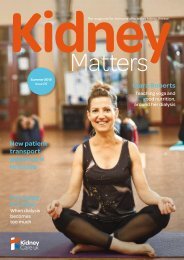Kidney Matters - Issue 12 Spring 2021
Kidney Matters is our free quarterly magazine for everyone affected by kidney disease. This issue includes a tribute to Kidney Care UK Chair of Trustees Professor Donal O'Donoghue who passed away due to covid-19 at the start of the year. There's also a feature on sex and relationships, how your views helped shape covid-19 national policy, medical articles on anaemia and simultaneous pancreas and kidney transplantation, and a feature interview with a transplant recipient on some of the social stigmas often faced by people with chronic health conditions within the Black, Asian and minority ethnic (BAME) community. As well as this, we'll be looking back at two years of the Kidney Kitchen as we cook up a tasty tandoori with guest chef and RNG dietitian, Gabby Ramlan.
Kidney Matters is our free quarterly magazine for everyone affected by kidney disease.
This issue includes a tribute to Kidney Care UK Chair of Trustees Professor Donal O'Donoghue who passed away due to covid-19 at the start of the year. There's also a feature on sex and relationships, how your views helped shape covid-19 national policy, medical articles on anaemia and simultaneous pancreas and kidney transplantation, and a feature interview with a transplant recipient on some of the social stigmas often faced by people with chronic health conditions within the Black, Asian and minority ethnic (BAME) community.
As well as this, we'll be looking back at two years of the Kidney Kitchen as we cook up a tasty tandoori with guest chef and RNG dietitian, Gabby Ramlan.
Create successful ePaper yourself
Turn your PDF publications into a flip-book with our unique Google optimized e-Paper software.
13
Walk this way – thanks to my
simultaneous pancreas and kidney
transplant By Mark Smith
If you’ve lived with insulin-dependent diabetes and chronic kidney disease the joy of
successful transplantation is immeasurable.
I was diagnosed with type 1 diabetes when I was 14. Not
only did this diagnosis determine a lifetime of injections
and blood monitoring, but it also impacted on the
potential career I’d wanted in the RAF. Diabetes would
ultimately also take a huge toll on my body. Despite
doing my best to manage it, over time parts of my
body began to suffer. Problems started with bladder
issues, male impotence, stomach problems (diabetic
gastropathy) and eye issues (diabetic retinopathy). As
I approached adulthood, it also started to affect my
kidney function (diabetic nephropathy).
Kidney disease was picked up as part of a study carried
out by York University, in which I participated. Despite
attempts to manage the decline in kidney function I was
soon referred to a nephrologist. In 2007 Dr Laboi told
me the damage to my kidneys was irreversible and that
I would need a transplant. We also discussed the option
of an SPK transplant.
If ever there was a ‘no brainer’, this was it.
I would need the kidney transplant anyway and in order
to protect the transplanted kidney I would require
immunsuppressing medication. Diabetes had damaged
my native kidneys, so it was likely that it would damage
any transplanted kidney too. I knew a SPK transplant was
a longer, more complex and higher-risk operation. But it
made perfect sense to me that I should go for it.
Receiving the call
I was listed for an SPK in December 2008. The call
came just eight months later on 6 July 2009. By this
time things in my life were really very tough. I was having
constant hypoglycaemic attacks (‘hypos’) that were
so severe that I often required paramedic intervention.
My wife Caroline and I had been through three failed
IVF attempts and, just a month before the call, I had
been made redundant from my position in the bank.
Also, along with the other health issues I was trying to
manage, I knew I would never fully recover from the loss
of my younger brother who had been killed in a road
accident in 1995. It was a low point in our family.
So the transplant signalled a real change of direction
for us. I spent 17 days in hospital. Most of that on the
intensive treatment unit (ITU) as I had suffered a
major bleed.
My recovery started the moment I arrived home. The
The power of having sufficient energy to be able to walk
is overwhelming. At first it was just walking around the
block. But within a year, I had climbed Mount Snowdon.
That same year we had a successful IVF treatment. A
short while later we had the opportunity to meet the
donor family through their own charitable work. My donor
was a 24-year-old victim of manslaughter. This meeting
was followed up by considerable media exposure and an
appearance on the Daybreak TV programme.
Since then, the pancreas and kidney (and two daughters
– our second being adopted) have given me a new lease
of life. In 2015 I walked the Yorkshire three peaks and
in 2016 I completed Hadrian’s Wall – raising £3,000.
Hadrian’s Wall was walked with my donor’s mother and
was an immensely rewarding experience for both of us.
A new career opens up
I now work with Kidney Care UK on their Patient Advisory
Group and am an ambassador for organ donation for
NHSBT. Over the past few years, I have been invited to
attend many events as an ‘inspirational speaker’ and
have won a couple of local awards for my work raising
awareness of the benefits of organ donation and
transplantation.
And I still walk, 20 miles to me now is just a simple
fun walk. This has all been possible because of my
SPK transplant, the expertise and care I received
and continue to receive from the transplant team at
Manchester Royal Infirmary, and the gift of this amazing
life that I received from my donor.
Issue 12 | Spring 2021

















